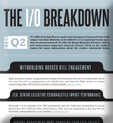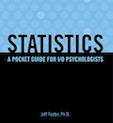 It's difficult to find time to read every new piece of rersearch that could impact the I/O field. However, to be effective, it is important to stay up to date on current research. To help, the Hogan Research Division collects and summarizes important articles every quarter. Click on the authors' names for more information about the studies.
It's difficult to find time to read every new piece of rersearch that could impact the I/O field. However, to be effective, it is important to stay up to date on current research. To help, the Hogan Research Division collects and summarizes important articles every quarter. Click on the authors' names for more information about the studies.
Withholding Bosses Kill Engagement
High scores on scales comprising the Hogan Development Survey’s moving-away factor are most harmful to engagement, job satisfaction, and burnout. High scores on scales comprising other HDS factors produce mixed results (Leary et al.).
CEO, Senior Executive Personalities Impact Performance
Although it is no surprise that CEO personality and the collective personality of senior executives both influence firm performance, what may be surprising is that the two act relatively independently of one another (Colbert et al.).
Virtual Harassment More Damaging Than Face-To-Face
Virtual workplace harassment (i.e., harassment via computer-based communications) can be just as psychologically damaging as face-to-face harassment, but even more so when the person doing the harassing is anonymous or from outside of the organization (Ford).
Is Too Much Creativity a Bad Thing?
All organizations need creative people, but overall levels of creativity might be less beneficial or even detrimental to large or risk-prone organizations (Gong et al.).
Values Predict Self-Starters in Ambiguous Jobs
Individual values predict how proactive employees will be on the job, but only in weak employment situations where ambiguity is high (Grant and Rothbard).
For Extraversion, Moderation is Key
When it comes to the relationship between extraversion and call center performance, individuals with moderate extraversion scores tend to do better than individuals with either low or high scores (Grant).
Shared Leadership Drives Innovation
Shared leadership within teams helps drive innovation (Hoch).
Neurotic People May Also Be Smarter
Both neuroticism and openness to experience are significantly related to certain aspects of higher level cognitive functioning (Murdock et al.).
Workplace Bullying Impacts Mental Health
Workplace bullying not only impacts performance, but also the overall mental health of employees (Nielsen et al.).
Conscientiousness More Important in Low-Level Jobs
Although generally predictive across jobs, conscientiousness may be particularly important for lower level jobs that are highly structured and less cognitively demanding (Shaffer & Postlewaite).
 Hogan’s scientific foundation and commitment to research distinguishes us from the competition. Each year, Hogan and our affiliates publish works that contribute to the knowledge and development of (a) the Hogan assessments and (b) the field of personality and psychology. These publications build the Hogan brand and allow us to better serve our clients worldwide.
Hogan’s scientific foundation and commitment to research distinguishes us from the competition. Each year, Hogan and our affiliates publish works that contribute to the knowledge and development of (a) the Hogan assessments and (b) the field of personality and psychology. These publications build the Hogan brand and allow us to better serve our clients worldwide.


 In the world of I/O Psychology, we are often presented with statistical results on a daily basis. Although useful, this can be a problem if we don't understand how to interpret results presented to us or know what questions we should ask to make sure those results are accurate.
In the world of I/O Psychology, we are often presented with statistical results on a daily basis. Although useful, this can be a problem if we don't understand how to interpret results presented to us or know what questions we should ask to make sure those results are accurate.